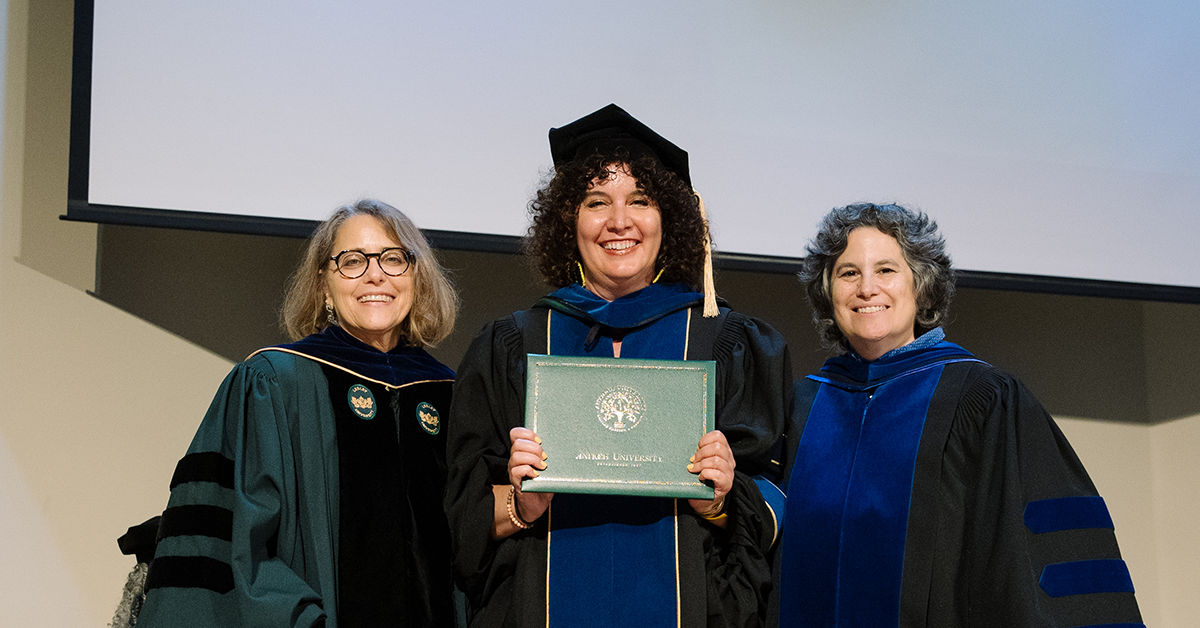In the ongoing fight for racial equity, the role of white facilitators is a complex and under-explored terrain. Alicia Wargo, a 2025 graduate of Antioch’s PhD in Leadership and Change, recently explored these questions in her doctoral dissertation, Embracing the Both/And: Learning from the Lived Experiences of White Facilitators of Racial Equity Workshops. Using the lens of Relational Cultural Theory (RCT), Wargo delves into the intricate dynamics of whiteness, relational accountability, and social justice, offering a fresh perspective on how white facilitators can navigate the discomfort and vulnerability inherent in this work.
In a recent conversation, Wargo discussed how her work focuses on connection as a site for growth and transformation in both intra-racial and cross-racial relationships. She also shared insights from her own work in the field and from her research on how growth-fostering relationships, mutual empathy, and embodied practices can sustain long-term engagement in racial equity efforts.
I’m interested in what inspired you to focus your dissertation on the experiences of white facilitators in racial equity work. How did your personal and professional journey shape the direction of that research?
I started the PhD in Leadership and Change program in June of 2020. Prior to that, I was a high school principal in the South Bronx. I had also been co-leading numerous racial equity initiatives alongside staff members. 2020 was a period of great turmoil in the United States. We were in the midst of a pandemic, George Floyd had just been murdered a month before, and I came to the program with this question: What is the role of white people in racial equity work? My interest in it remained unchanged throughout the program. I had life transitions during the program. I left being a high school principal in 2022, and I now work as an educational consultant. I also facilitate, on my own or with others, white accountability spaces, such as white affinity groups. I was noticing a few things. There’s a fair amount of research on why white people should be doing racial equity work, how white people should be doing it, and what we get wrong in doing the work. But there was not a lot of research that was really about what it actually feels like to be doing this work in the moment of facilitating. What are the things that you’re navigating internally and externally, and how do you do that? I went in with the question: How do white facilitators navigate the complexity of embodying whiteness while challenging whiteness?
I really love that. I want to ask you about the role Relational Cultural Theory (RCT) played in your dissertation. How did the tenets of RCT inform your understanding of the role of relationships in racial equity facilitation?
I did not go into this dissertation thinking that I was going to use RCT. I went in with curiosity. In the dissertation, I don’t talk about RCT in the literature review. What I realized through the analysis process of my research data is how strongly relationships were coming out. I think about relationships in three layers. So, the relationship with oneself. The relationship with other white people, so, intra-racial relationships. And also cross-racial relationships. As I was doing the analysis of the interviews, a couple of things stood out to me. There is this idea that racial equity work and facilitation are not done in isolation—it is done in relationship to other people. I would argue, and this is something that comes out in the dissertation, that we learn about our whiteness through interactions with other white people and through interaction with people of the global majority. Whiteness happens in a relationship. And that was something a few of the participants talked about. I remember one of the participants said that whiteness takes us out of a relationship with ourselves. So this idea that going through racial equity work and going through that journey of understanding our whiteness, learning our whiteness, the processing of that is something that happens during racial equity work. Growth-fostering relationships are also essential.
Very often, we can think about a good relationship as one that’s not difficult, that doesn’t have conflict. RCT states that we foster growth in connection within our ability to have difficult conversations with one another. As a facilitator, to be able to facilitate difficult discussions—both intra-racially and cross-racially—is very dependent upon the way that we establish relationships.
How does the way we establish relationships impact this racial equity work?
There was a part of the dissertation that talked about the complexity of navigating divergent perspectives from people of the global majority as a white facilitator. People of the global majority are not a monolith—and white people are not a monolith. While it is essential to listen to divergent perspectives and feedback sometimes, it came out very strongly in the research that white facilitators needed to make a choice on how to act in relation to differing, sometimes conflicting points of view. Some other things that came out in the research were this theme of white people abandoning each other in racial equity work and the necessity of being able to build community with each other.
Whiteness takes us out of a relationship with ourselves. Whiteness promotes a culture of disconnection, which Dr. Maureen Walker talks about in her work. That culture itself is the root of disconnection. So you get a bunch of white people in a room together, and I’m talking about white affinity spaces. We can be really mean to each other in this work. And this idea, one of the themes that came out in the research is, how do we hold each other accountable? This is part of a growth-fostering relationship. Then we can begin, in community, to unlearn and interrupt whiteness together.
The role of power is significant in RCT also. Can you elaborate on the role of power in this context?
Whiteness is rooted in power. If I have internalized the belief that I need to be powerful, I need to separate myself from other people, I need to be more special than other white people, then I am not going to be able to be in a relationship and in a community with my fellow white people who are also committed to interrupting whiteness in ourselves and in society. I can then replicate whiteness in the social justice space. That was one of the pieces I felt in the research.
I was hoping to talk a little more about why RCT is well suited for communicating across difference. Why is it a good framework for understanding how racism has created disconnection in our relationships and in our country.
RCT talks about growth in connection. One of the things that Dr. Maureen Walker says is that in order for connection to occur, each person needs to be able to receive and respond to the experiences of other people. The culture in the United States is steeped in white supremacy culture. So if we’re talking about building relationships in a culture of whiteness that Maureen talks about, then the culture itself is the site of disconnection. When we’re talking about building relationships, we have to acknowledge the culture. I’ve heard Dr. Harriet Schwartz speak about this as well. RCT acknowledges that relationships don’t happen in a vacuum. So, if the culture is rooted into disconnection, then I, as a white person, have to do the internal work of understanding, not only my whiteness, but the history of what it means to be in cross-racial relationships as a white person in the United States of America. There’s a historical context, there’s a contemporary context, and then there’s a people context.
Unexamined whiteness within white people perpetuates whiteness within ourselves and in the relationships we make, both intra-racially and cross-racially. Because we are white people, we psychologically, physically, and emotionally embody whiteness because of the culture that we’ve been raised in. We need as white people to continually stir, unravel, and examine our whiteness to be able to enter into a cross-racial growth-fostering relationship. If we do not do that work, we are going to perpetuate harm in that relationship. One of my participants said: ‘We as white folks are not going to get it perfect and then be in a relationship with Black folks. We are going to mess up all the time. Having the skills and tools to know what to do when we mess up determines whether or not we’re going to get to stay in the relationship.’
I’m struck by what you’re saying about unexamined whiteness. I’m wondering how much of that is shame-related?
So there are a couple of things. There is the work of Tema Okun, who wrote ‘White Supremacy Culture.’ It’s very well known. In it she talks about how part of whiteness is what we believe is our right to comfort. White people don’t know what to do when we feel uncomfortable. We want to go back to comfort. This also goes back to what Maureen talks about: the culture of whiteness. We have been socialized to always feel comfortable in every space that we’re in. So, when we are met with discomfort, we want to run away from it. So it’s not just running away from other white people but also running away from our own discomfort.
So shame came out as an emotion that comes up for white people in my research. We do feel shame. I feel shame a lot in this work. When we talk about embracing both/and, it’s not saying I will get to a point where I never feel shame. It’s that I want to get to a point where I can tolerate it. But what do I do with that when I feel shame? This is particularly applicable in cross-racial spaces. When I’m in a cross-race social justice space and I’m feeling uncomfortable, am I projecting my shame outward so that everybody has to take care of me? Because if I’m l saying, ‘Oh my God, I feel so uncomfortable’—and then everyone needs to make me feel better—can I learn? When we talk about the internal work, just to sit with however I’m feeling in the moment, I try to say, ‘Okay, that’s my shame coming up and I’m just going to sit with it. I’m going to notice it in my body, I’m going to sit with it, I’m going to acknowledge it.’
Lastly, I am wondering what advice you have for someone who’s considering pursuing their PhD looking to focus on social justice or equity research. What is something important for them to know as they embark on that work?
Social justice work is emotional work. If you are doing qualitative interviews, a lot of things are going to come up from the participants. It’s very important to make space to be able to process your own emotions as you’re doing this work. That’s something I’ve had to learn.
Also, right now, it is crucial to address the area of social justice you wish to write about. We need to do this work now. Writing about social justice is a form of resistance, particularly in this moment. You should also be aware of how writing about any aspect of social justice work will affect you. What happens is that people who want to write about social justice work are also doing the work themselves. It’s a lot to carry—and it’s needed. So my biggest advice is to be kind to yourself, pace yourself, and acknowledge your feelings.




